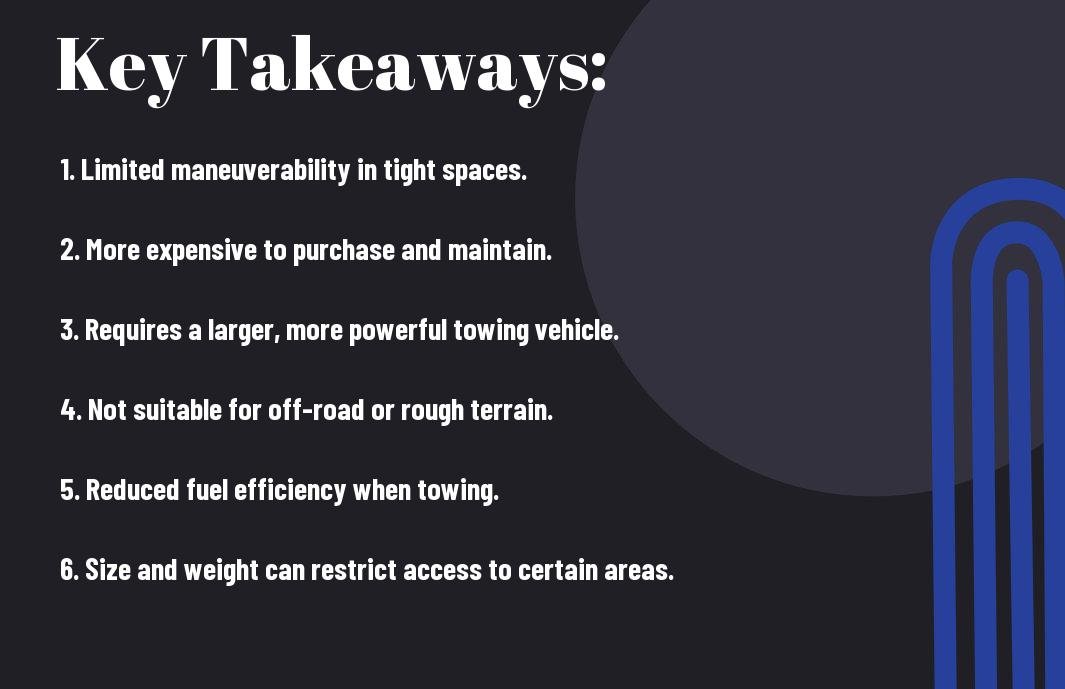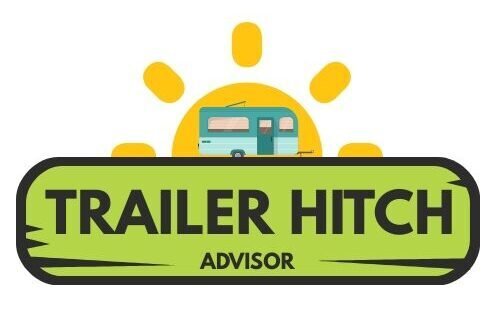While fifth wheel trailers are popular choices for many RV enthusiasts, it’s important to consider the limitations and drawbacks they come with. One of the main disadvantages of a fifth wheel is the difficulty of maneuvering and parking in tight spaces. The large size and weight distribution can make it challenging, especially for inexperienced drivers. Additionally, because the hitch is located in the bed of the truck, it takes up valuable cargo space and limits the use of the truck when not towing. Another drawback is the extra maintenance and potential for mechanical issues with the moving parts of the hitch and maneuverability. Lastly, because of the elevated design, there is an increased risk of instability and tipping over in windy conditions. These factors are important to consider when deciding if a fifth wheel is the right choice for your RV needs.
Key Takeaways:
- Higher initial cost: Fifth wheel trailers typically require a larger, heavier-duty truck to tow, which means added expenses in both the purchase of the trailer and the truck.
- Less maneuverability: The hitch design of a fifth wheel restricts the turning radius of the towing vehicle, making it more challenging to navigate tight spaces and turn corners.
- Storage limitations: Fifth wheel trailers are not as versatile when it comes to parking and storing them, as they require a dedicated hitch in the bed of a truck.
- Fuel efficiency: Towing a fifth wheel can have a negative impact on the fuel efficiency of the towing vehicle, resulting in higher fuel costs during travel.
- Specialized equipment: Due to their size and weight, fifth wheels often require additional equipment such as a hitch and brake controller, adding to the overall cost and complexity of ownership.
- Accessibility issues: Some campsites and RV parks may have limited accommodations for fifth wheel trailers, making it more difficult to find suitable places to stay while traveling.
- Limitations in off-road use: Fifth wheels are not as conducive to off-road adventures as other types of RVs due to their hitch design and higher clearance.

Maneuverability and Handling Challenges
Some of the disadvantages of a fifth wheel are the maneuverability and handling challenges that come with towing a larger, heavier trailer behind your vehicle. The unique hitching system of a fifth wheel can present some difficulties when it comes to navigating tight spaces and making sharp turns.
Size and Turning Radius Issues
When towing a fifth wheel, you may encounter challenges related to the size and turning radius of the trailer. The length and width of a fifth wheel can make it difficult to maneuver in crowded parking lots, narrow streets, or tight campground spaces. Additionally, the turning radius of a fifth wheel is often wider than that of a conventional trailer, requiring more space to make sharp turns without causing damage to your vehicle or the trailer. This can limit your flexibility and increase the risk of accidents.
Reversing Complications
Another handling challenge of a fifth wheel is the difficulty of reversing the trailer. Due to the pivot point of the hitch being located inside the bed of the truck, reversing a fifth wheel requires a different technique compared to a conventional trailer. You may find it challenging to accurately control the direction of the trailer when backing up, potentially leading to jackknifing or other dangerous situations. This can be particularly stressful and time-consuming, especially for those new to towing a fifth wheel.
When towing a fifth wheel, it’s important to be aware of the maneuverability and handling challenges that come with it. Proper planning, practice, and caution are essential when navigating tight spaces and reversing the trailer. Understanding the limitations of your fifth wheel and being mindful of potential difficulties can help you avoid accidents and enjoy a smoother towing experience.
Towing Requirements
Not all vehicles are equipped to tow a fifth wheel trailer, so it’s important to consider the towing requirements before purchasing one. Understanding the towing capacity of your vehicle and the specific requirements for towing a fifth wheel trailer is crucial to ensure a safe and successful towing experience.
Heavy-Duty Tow Vehicle Necessity
When it comes to towing a fifth wheel trailer, you’ll need a heavy-duty tow vehicle that is capable of handling the weight and size of the trailer. This means that you may need to invest in a larger, more powerful truck to safely tow a fifth wheel. Without a suitable tow vehicle, you run the risk of putting yourself and others in danger on the road. The weight and size of a fifth wheel trailer require a vehicle with a sturdy frame and powerful engine to handle the load without compromising safety.
Hitch Specifics and Compatibility
Another important aspect to consider when it comes to towing a fifth wheel is the hitch specifics and compatibility. Fifth wheel trailers require a specific type of hitch – a fifth wheel hitch, which is mounted in the bed of the truck. Not all trucks are equipped with this type of hitch, so you may need to invest in one and have it professionally installed. Additionally, the hitch and trailer must be compatible in terms of weight capacity and design. Choosing the wrong hitch or using an incompatible hitch can lead to serious accidents on the road.
In summary, understanding the towing requirements for a fifth wheel trailer is crucial to ensure a safe and successful towing experience. Not having the appropriate heavy-duty tow vehicle and hitch compatibility can pose serious safety risks for you and other road users. It’s important to carefully consider these factors before investing in a fifth wheel trailer to avoid any dangerous situations. Remember, your safety and the safety of others on the road should always be your top priority.
Cost Considerations
Now let’s take a look at the cost considerations when it comes to owning a fifth wheel. There are several factors to consider when it comes to the financial aspects of owning and maintaining a fifth wheel, and it’s important to be aware of these considerations before making a purchase.
Initial Investment and Depreciation
When you first purchase a fifth wheel, you will likely be making a significant investment. While this can provide you with the freedom and flexibility to travel and explore, it’s important to keep in mind that fifth wheels, like all vehicles, depreciate in value over time. This means that the initial investment you make may not hold its value as well as other types of investments. However, by taking proper care of your fifth wheel and keeping up with maintenance, you can help mitigate some of the depreciation.
Maintenance and Repair Expenses
Another cost consideration when it comes to fifth wheels is the maintenance and repair expenses. Like any vehicle, a fifth wheel requires regular maintenance to ensure it remains in good working condition. This can include things like regular oil changes, brake inspections, and tire rotations. Additionally, because a fifth wheel is subject to wear and tear from being on the road, there is the potential for more significant repair expenses over time. While having a fifth wheel can provide you with an incredible amount of freedom and adventure, it’s important to be aware of the ongoing maintenance and repair expenses that come with ownership.
You need to understand that owning a fifth wheel comes with its own set of cost considerations. The initial investment and depreciation, as well as ongoing maintenance and repair expenses, are important factors to keep in mind. While the freedom and adventure that come with owning a fifth wheel can be incredibly rewarding, it’s crucial to be aware of the potential financial implications. By understanding and planning for these costs, you can make the most informed decision when it comes to purchasing and owning a fifth wheel.
Lifestyle and Practicality Limitations
Keep in mind that the fifth wheel lifestyle may not be suitable for everyone. While it offers many benefits, there are also certain limitations that you should consider. These limitations can impact your daily life and overall experience on the road. Here are some of the lifestyle and practicality limitations associated with owning a fifth wheel.
Accessibility and Parking Constraints
When you choose a fifth wheel, you need to be aware of the limitations it presents in terms of accessibility and parking. maneuvering a large fifth wheel in tight spaces can be challenging, and finding suitable parking spots can be limited in certain areas. Additionally, some camping grounds or RV parks may have size restrictions that limit where you can stay. This can be frustrating and may limit your travel options.
Living Space Adaptability
Another consideration is the living space adaptability of a fifth wheel. While these vehicles offer a comfortable and spacious living area, it may not be as versatile as you would like. The layout and design are fixed, which means you have less flexibility to rearrange or customize the living space to your liking. This could be a limitation if you have specific needs or preferences for your living area.
Disadvantages of a Fifth Wheel
From above, you can see that there are several disadvantages to choosing a fifth wheel as your recreational vehicle. These include the need for a larger truck to tow it, limited mobility once parked, and potential difficulties with maneuvering and parking in tight spaces. In addition, the initial cost of a fifth wheel may be higher compared to other RV options, and there are maintenance and storage considerations as well. Overall, it’s important to carefully weigh these disadvantages against the benefits of a fifth wheel before making your decision.
FAQ
Q: What are the disadvantages of a fifth wheel?
A: There are several disadvantages of a fifth wheel, including limited maneuverability, higher initial cost, and the need for a larger tow vehicle.
Q: Is limited maneuverability a disadvantage of a fifth wheel?
A: Yes, due to the design and hitch placement of a fifth wheel, they are less maneuverable than traditional travel trailers, especially in tight spaces or when backing up.
Q: Are fifth wheels more expensive than other types of RVs?
A: Yes, fifth wheels typically have a higher initial cost compared to travel trailers or motorhomes of similar size and amenities.
Q: Do fifth wheels require a larger tow vehicle?
A: Yes, due to their weight and design, fifth wheels generally require a larger and more powerful tow vehicle compared to other types of RVs.
Q: What are some other disadvantages of a fifth wheel?
A: In addition to limited maneuverability and higher initial cost, fifth wheels also require a special hitch, making it less versatile for towing other trailers, and they may have limited clearance in some camping areas or gas stations. Additionally, they may have less living space compared to motorhomes of similar length.
